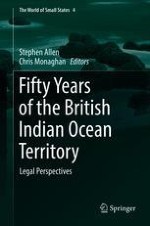2018 | OriginalPaper | Buchkapitel
6. An Imperfect Legacy: The Significance of the Bancoult Litigation on the Development of Domestic Constitutional Jurisprudence
verfasst von : Chris Monaghan
Erschienen in: Fifty Years of the British Indian Ocean Territory
Aktivieren Sie unsere intelligente Suche, um passende Fachinhalte oder Patente zu finden.
Wählen Sie Textabschnitte aus um mit Künstlicher Intelligenz passenden Patente zu finden. powered by
Markieren Sie Textabschnitte, um KI-gestützt weitere passende Inhalte zu finden. powered by
